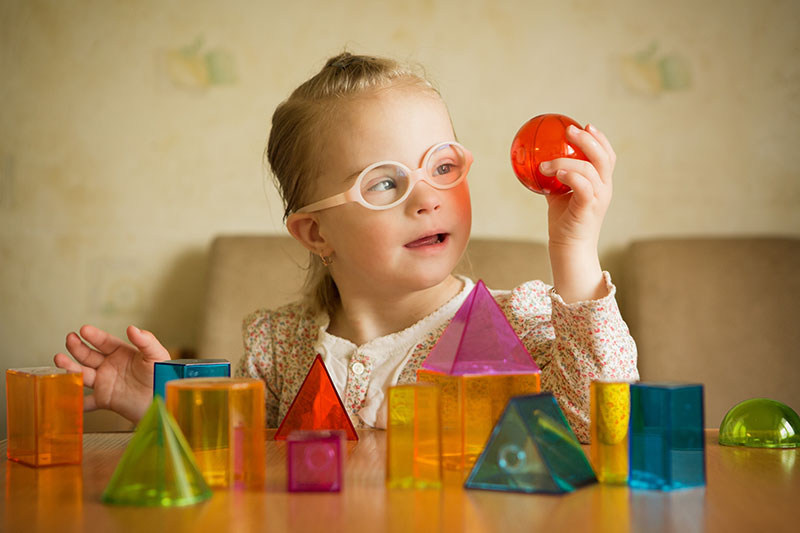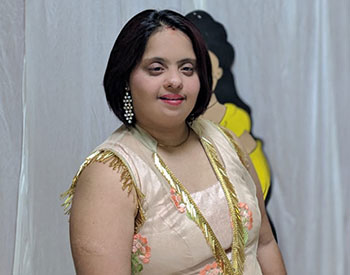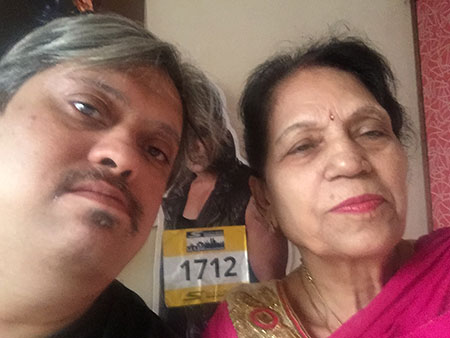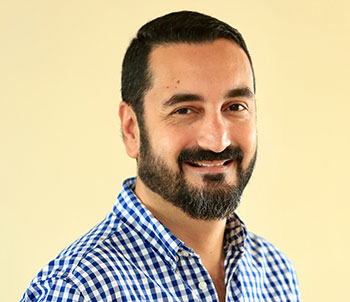 “For most parents, the idea of raising a child with Down Syndrome (DS) could seem like an onerous task. I remember feeling a sense of soul-crushing hopelessness when I was informed by the doctors that my daughter Ashritha Shetty was born with Down Syndrome 35 years ago. At that moment, my life was filled with grief thinking about what my daughter’s life would be like. People were hardly aware about the syndrome then. There
“For most parents, the idea of raising a child with Down Syndrome (DS) could seem like an onerous task. I remember feeling a sense of soul-crushing hopelessness when I was informed by the doctors that my daughter Ashritha Shetty was born with Down Syndrome 35 years ago. At that moment, my life was filled with grief thinking about what my daughter’s life would be like. People were hardly aware about the syndrome then. There  were no resources, support groups, Internet or social media at that time. However, as a parent I decided to take the plunge and learnt everything about Down Syndrome. Bringing up Ashritha has been a challenging and yet a delightful experience in its own way. When Ashritha was growing up, I decided to enroll her in a special school and tried to give her all happiness and care she deserved. I was never ashamed of taking my daughter to social functions or public places, and like any normal child, Ashritha also used to participate in Bollywood dance performances in the community events. Currently Ashritha is undergoing training at Café Arpan – an initiative of the non-profit Yash Charitable Trust in Mumbai – that provides a workplace for the differently-abled. Ashritha is interested in modelling; she has done her portfolio and wishes to pursue a career in the world of glamour. There are several modelling opportunities for people with DS abroad; hopefully in India too it will happen soon. Until now I am proud of her growth and achievements,” claims Amritha Shetty, vice president of the 100-member strong Parents of Down Syndrome Association, Mumbai. Incepted in 1988, the association provides parents with the information, techniques and resources that can best help children with Down Syndrome develop into independent individuals.
were no resources, support groups, Internet or social media at that time. However, as a parent I decided to take the plunge and learnt everything about Down Syndrome. Bringing up Ashritha has been a challenging and yet a delightful experience in its own way. When Ashritha was growing up, I decided to enroll her in a special school and tried to give her all happiness and care she deserved. I was never ashamed of taking my daughter to social functions or public places, and like any normal child, Ashritha also used to participate in Bollywood dance performances in the community events. Currently Ashritha is undergoing training at Café Arpan – an initiative of the non-profit Yash Charitable Trust in Mumbai – that provides a workplace for the differently-abled. Ashritha is interested in modelling; she has done her portfolio and wishes to pursue a career in the world of glamour. There are several modelling opportunities for people with DS abroad; hopefully in India too it will happen soon. Until now I am proud of her growth and achievements,” claims Amritha Shetty, vice president of the 100-member strong Parents of Down Syndrome Association, Mumbai. Incepted in 1988, the association provides parents with the information, techniques and resources that can best help children with Down Syndrome develop into independent individuals.
 Sharing a similar story, 73-year-old Geetha Sehjpal, mother of 37-year-old Gaurav Sehjpal diagnosed with DS says, “37 years back, doctors did not give me a clear picture of what my son was suffering from. Due to lack of enough resources it was much later that we got to know that Gaurav was suffering from DS. Since he had two elder siblings – both girls, nine to ten years older than him, I was a little at ease. They loved and supported Gaurav a lot. Eventually Gaurav found his passion in dance and made his way into the famous Indian choreographer Shiamak Davar’s Victory Arts Foundation. Promoted in 2004 to make dance accessible to the lesser privileged and those with special needs – the foundation offered a great platform for Gaurav to showcase his dancing talent. Although today the situation is a lot better, I still feel that the medical facilities available for the differently-abled are not adequate. Comprehensive assessment and treatment is not available. If at all it is available, it is out of reach of most of the parents.”
Sharing a similar story, 73-year-old Geetha Sehjpal, mother of 37-year-old Gaurav Sehjpal diagnosed with DS says, “37 years back, doctors did not give me a clear picture of what my son was suffering from. Due to lack of enough resources it was much later that we got to know that Gaurav was suffering from DS. Since he had two elder siblings – both girls, nine to ten years older than him, I was a little at ease. They loved and supported Gaurav a lot. Eventually Gaurav found his passion in dance and made his way into the famous Indian choreographer Shiamak Davar’s Victory Arts Foundation. Promoted in 2004 to make dance accessible to the lesser privileged and those with special needs – the foundation offered a great platform for Gaurav to showcase his dancing talent. Although today the situation is a lot better, I still feel that the medical facilities available for the differently-abled are not adequate. Comprehensive assessment and treatment is not available. If at all it is available, it is out of reach of most of the parents.”
India is a country with one of the highest rates of Down Syndrome worldwide – approximately 1 out of 830 live births is affected with DS – according to the Down Syndrome Federation of India. According to the medical experts, DS is a genetic disorder that is caused by the presence of all or part of a third copy of chromosome 21 and is associated with impaired physical and cognitive development.
 With rapid development in medical therapies and special schools, many medical professionals and special educators believe that DS isn’t something that the parents should anymore be scared about. “Children diagnosed with DS will have some degree of intellectual disability/impairment, usually in the mild to moderate range. Children with DS have global developmental delays, but are able to do most things that any young child can do, such as walking, talking, dressing, and being toilet trained. However, the exact age that these developmental milestones will be achieved cannot be predicted. There are various therapies that can help the children with DS which includes the Physical Therapy, Speech-language Therapy, Occupational Therapy, Behavioral Therapy offered in special schools. It is best for the parents to accept this condition completely so as to best plan their way forward,” says Dr. Zirak Marker, child and adolescent psychiatrist, medical director of The Aditya Birla Integrated School, Mumbai and advisor for Mpower.
With rapid development in medical therapies and special schools, many medical professionals and special educators believe that DS isn’t something that the parents should anymore be scared about. “Children diagnosed with DS will have some degree of intellectual disability/impairment, usually in the mild to moderate range. Children with DS have global developmental delays, but are able to do most things that any young child can do, such as walking, talking, dressing, and being toilet trained. However, the exact age that these developmental milestones will be achieved cannot be predicted. There are various therapies that can help the children with DS which includes the Physical Therapy, Speech-language Therapy, Occupational Therapy, Behavioral Therapy offered in special schools. It is best for the parents to accept this condition completely so as to best plan their way forward,” says Dr. Zirak Marker, child and adolescent psychiatrist, medical director of The Aditya Birla Integrated School, Mumbai and advisor for Mpower.
 Says Sharon Fernandes, special educator working with DS children in Dilkhush Special School, Mumbai since the past three decades, “Parents need to remind themselves that those diagnosed with DS are people who are more alike than they are different. At Dilkhush Special School, we ask the parents to raise the bar in general and push the kids a little bit, so that they too realise their potential and strive for better.”
Says Sharon Fernandes, special educator working with DS children in Dilkhush Special School, Mumbai since the past three decades, “Parents need to remind themselves that those diagnosed with DS are people who are more alike than they are different. At Dilkhush Special School, we ask the parents to raise the bar in general and push the kids a little bit, so that they too realise their potential and strive for better.”
Fernandes adds, “Early intervention programmes, beginning in infancy, can help these children achieve their individual potential. Physiotherapy and the occupational therapy should begin as soon as the children are diagnosed with the DS. The pediatricians today are able to guide the parents to the right centres, hence parents need not worry where to start with. Further, parents play a crucial role in showing the child how much they love them and this is a first step for the children to understand they are accepted. If parents are having any problems getting over the trauma or hurdles in accepting the child then they should definitely opt for counseling. Also, once the parents accept the children, they should spread awareness in their social circles so that more people get to know about DS.”
Apart from the above, parents also need to observe certain behavioral precautions at home. Shetty recommends that parents should try and protect the special kids from being mocked or being ridiculed at, since they are sensitive and can easily get upset in such situations. Parents should also avoid fighting or arguing in front of these kids because they are extremely sensitive to harsh words and raised voices. Also parents should allow kids with DS enough time to complete their tasks and not push them to hurry, no matter how long they take. An important rule of thumb to follow is that the kids with DS should not be given too much of instructions because they tend to get easily confused with information overload.
With all the support and love from families, relatives and schools, the future of the children diagnosed with DS looks quite bright. “After the children have undergone their training depending on their capabilities they can get jobs as office assistants, work in beauty parlours, and can also be placed in cafes, hotels, housekeeping and many more,” concludes Fernandes.
Some important facts about Down Syndrome
Symptoms of Down Syndrome (DS) were included in the medical literature since 1866, when a British physician who practiced at London and Earlswood, Langdon John Down, described the physical and mental characteristics of intellectually challenged individuals under his care.
Back then, individuals with DS were referred to as “mongoloids,” and the disease, as “mongolism”.
In 1965, the World Health Organisation (WHO) dropped the term “mongolism”; in 1975, the National Institute of Health, USA, recommended the term Down Syndrome to replace all the other names describing such a phenotype.
While there are no symptoms that a mother experiences during pregnancy, a series of screenings and tests can help detect Down Syndrome before birth.
Down Syndrome is associated with mild to moderate learning disabilities, growth milestone delays, certain facial features and low muscle tone in early infancy.
Individuals with Down Syndrome are more prone to various infections due to their inherently low resistance. Many individuals with Down Syndrome go on to develop heart defects, leukaemia, early-onset Alzheimer’s disease, gastro-intestinal problems, and other health issues.
Odeal D’Souza























